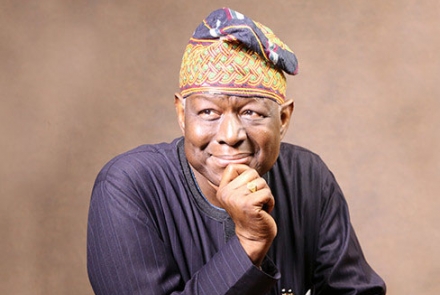
Image by UNPFA: Dr Babatunde Osotimehin
Vale Babatunde Osotimehin
Sharon Bessell reflects on the death of Dr Babatunde Osotimehin, and writes that we should all strive to live up to his example.
Crawford School of Public Policy has the privilege of hosting leaders from around the world and from all areas of public policy. But few have made the powerful and lasting impression of Dr Babatunde Osotimehin, Executive Director of the United Nations Population Fund (UNFPA), who spoke at Crawford and gave an interview for Policy Forum’s podcast series in March this year. Crawford School and Policy Forum now join the many organisations around the world who mourn the sudden passing of Dr Osotimehin on 4 June 2017.
Dr Osotimehin was appointed as Executive Director of UNFPA in 2011 and spearheaded the organisation’s efforts to ‘deliver a world where every pregnancy is wanted, every childbirth is safe and every young person’s potential is fulfilled’. When he spoke at the Crawford School, the depth of his commitment to this mission was powerfully conveyed through his quiet but passionate message: women and girls must have the right to control their own bodies; if they do not, they cannot control their lives or futures.
Dr Osotimehin was trained as a medical practitioner, receiving his medical degree from the University of Ibadan, Nigeria in 1972 and his doctorate in medicine from the University of Birmingham in 1979. He knew first-hand the terrible – and preventable – health impacts that result from the absence of sexual and reproductive health services, and from the absence of the right to access those services.
When speaking at Crawford, Dr Osotimehin related a story from his experience as Nigeria’s Minister of Health. He described visiting a maternity centre, where he saw a women who had been in labour for 36 hours and was in great distress. When Dr Osotimehin asked why the women had not received a Caesarean section he was told that the patient could not afford to pay. Dr Osotimehin replied “Really, you have two lives here and you are just allowing them to pass.”
As Dr Osotimehin related the story, two things have stayed with me – and many others who were privileged to be in the audience that evening. First, Dr Osotimehin paid for the woman to have the Caesarean section – he acted not only as a Minister of Health, but as a human being who cared about the fate of another. Second, he went on to explain that the woman and her baby died. When he asked the maternity section what became of the husband, he was told that he had dropped off his wife and left. He would, the maternity centre staff explained, simply return to his village and find another wife.
Dr Osotimehin’s words to his audience were powerful. After telling this story, he argued that a man who shows such disregard for his wife should be in jail, and never have the opportunity to marry again. He conveyed emphatically his view that the personal is (or should be) political. Dr Osotimehin argued that this case is symptomatic of what is happening in so many parts of the world, where “women just don’t have value.” As Executive Director of UNFPA and Under-Secretary of the United Nations, Dr Osotimehin worked tirelessly to bring about real change. He was a champion for women and girls – and for men and boys who refuse to accept that women’s lives matter less. He demonstrated that responsibility for change lies with individuals, communities, governments and the global community. He demonstrated that every one of us can play a role in ending gender inequality and violence against women – and this message is his powerful legacy, and one that we must carry forward.
Dr Osotimehin’s approach to achieving the right to sexual and reproductive health for all and his commitment to the empowerment of women and young people encapsulates what the Crawford School and all of us working in public policy seek to bring to public debates and analysis: evidence and empathy, respect and rigour.
We mourn his passing, and echo his message: that each of us – in our professional and personal lives – strive to create a world in which girls and boys, women and men are able to live lives of dignity and respect, free from violence and discrimination. Vale Babatunde Osotimehin.
Updated: 16 August 2024/Responsible Officer: Crawford Engagement/Page Contact: CAP Web Team













